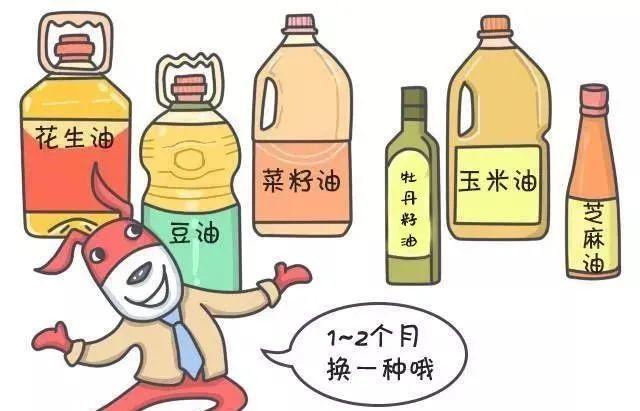Does eating the same oil often have any health effects?
Vegetable oil roasted vegetables produce carcinogens?
Olive oil can fight cancer and radiation, so the more the merrier?
……
There are many rumors about edible oil, and today let Cai Jun, chief physician of the Clinical Nutrition Department of Longhua Hospital affiliated to Shanghai University of Traditional Chinese Medicine, come to break the seven rumors about edible oil for everyone!
Myth 1: Eating the same oil often has no health effect
Truth: Different plant cooking oils have different levels of linolenic acid and linoleic acid, different fatty acid compositions, and different nutritional values.

(Image from the Internet)
If you eat the same oil for a long time, the human body is prone to a certain type of fatty acid, affecting health. Therefore, it is recommended that you prepare several kinds of cooking oils in the kitchen at home, and use them alternately, which is more beneficial to health.
Myth two: Vegetable oil roasting vegetables will produce carcinogens
Truth: Experiments have proved that at a high temperature of 180 ° C, cooking some vegetable oils with a high degree of saturation (such as sunflower oil and corn oil) for a long time releases more aldehydes, ketones, lactones and other carcinogens than oils with higher saturation (such as animal oil and coconut oil).
However, the experiment specifically refers to highly unsaturated vegetable oils such as sunflower oil and corn oil, not all vegetable oils.
In addition, all cooking oils should not be used for a long time (or repeatedly) at high temperatures, as long as according to the heat resistance or smoke points of different vegetable oils, try to use frying, roasting, baking, frying and other high-temperature cooking methods, generally will not have an impact on health.
Myth three: Olive oil can fight cancer and radiation, so the more the merrier
Truth: Olive oil is rich in monounsaturated fatty acids and polyunsaturated fatty acids, of which the omega-3 fatty acids in polyunsaturated fatty acids can inhibit the growth of tumor cells and reduce tumor incidence; it is also rich in polyphenols and lipopolysaccharides with radiation protection effects, so olive oil has anti-cancer and radiation-proof health care effects.
Although olive oil can fight cancer and prevent radiation, it can not be eaten in excess for a long time, it is recommended to replace it with other vegetable oils, and the daily intake of edible oil is 25 to 30 grams.
Myth Four: Animal fats are healthier
Truth: Animal fats and vegetable fats have their own nutritional advantages and deficiencies.
Animal oils and fats contain more saturated fatty acids, and excessive consumption will increase the body's total cholesterol and LDL cholesterol, which is easy to cause problems such as hyperlipidemia and obesity.
It is recommended that animal fats and vegetable oils and fats be used together, and the amount of animal fats consumed every day accounts for 10% to 20% of the total intake of oils and fats.
Myth five: Not eating oil can lose weight
Truth: The purpose of diet and weight loss is to make the body's total energy intake less than the energy consumed. In addition to providing the energy needed by the body, oils and fats also provide essential fatty acids and some fat-soluble vitamins needed for normal metabolism of the human body, which have anti-inflammatory, anti-allergic, immune-regulating and other effects.
If you don't eat any oil, it is easy to cause a lack of these essential nutrients and affect your health. In addition, oil has a good sense of satiety, lack of oil food is easy to produce hunger, forcing people to consume too much sugar, and too much sugar makes the intake of total energy remain high, can not achieve the effect of weight loss.
Myth Six: Zero trans fatty acid cooking oil can be eaten at will
Truth: "Zero trans fatty acids" does not equal the content of "0", the "0" boundary value of trans fatty acids is ≤0.3 g / 100 g (ml), that is, zero trans fatty acid edible oil also has the possibility of trans fatty acids. Although "zero trans fatty acids" are relatively healthy, they do not solve the problems caused by excessive oil intake.
Therefore, zero trans fatty acid edible oil should not be eaten casually, and the principle of daily intake of 25 to 30 grams must be followed. What needs to be emphasized is to promote scientific cooking methods and avoid cooking oil from being fried, fried and roasted for a long time at high temperatures. After all, any cooking oil is the main way to produce trans fatty acids under prolonged heat conditions.
Myth Seven: Different people can choose the same kind of oil, such as obese people and lean people with the same oil has no impact on health
Truth: Different groups of people should use a variety of edible oils according to their own characteristics and needs, on the basis of controlling the total intake of edible oil, with their respective edible oil composition ratios, and should not choose the same kind of edible oil in a uniform manner.
For example, obese people should increase the proportion of edible oils with unsaturated fatty acids (such as olive oil, tea seed oil, etc.), while lean people should choose more edible oils with high saturated fatty acids (such as cottonseed oil, palm oil, etc.).
Popular science source:
Shanghai Public Health News